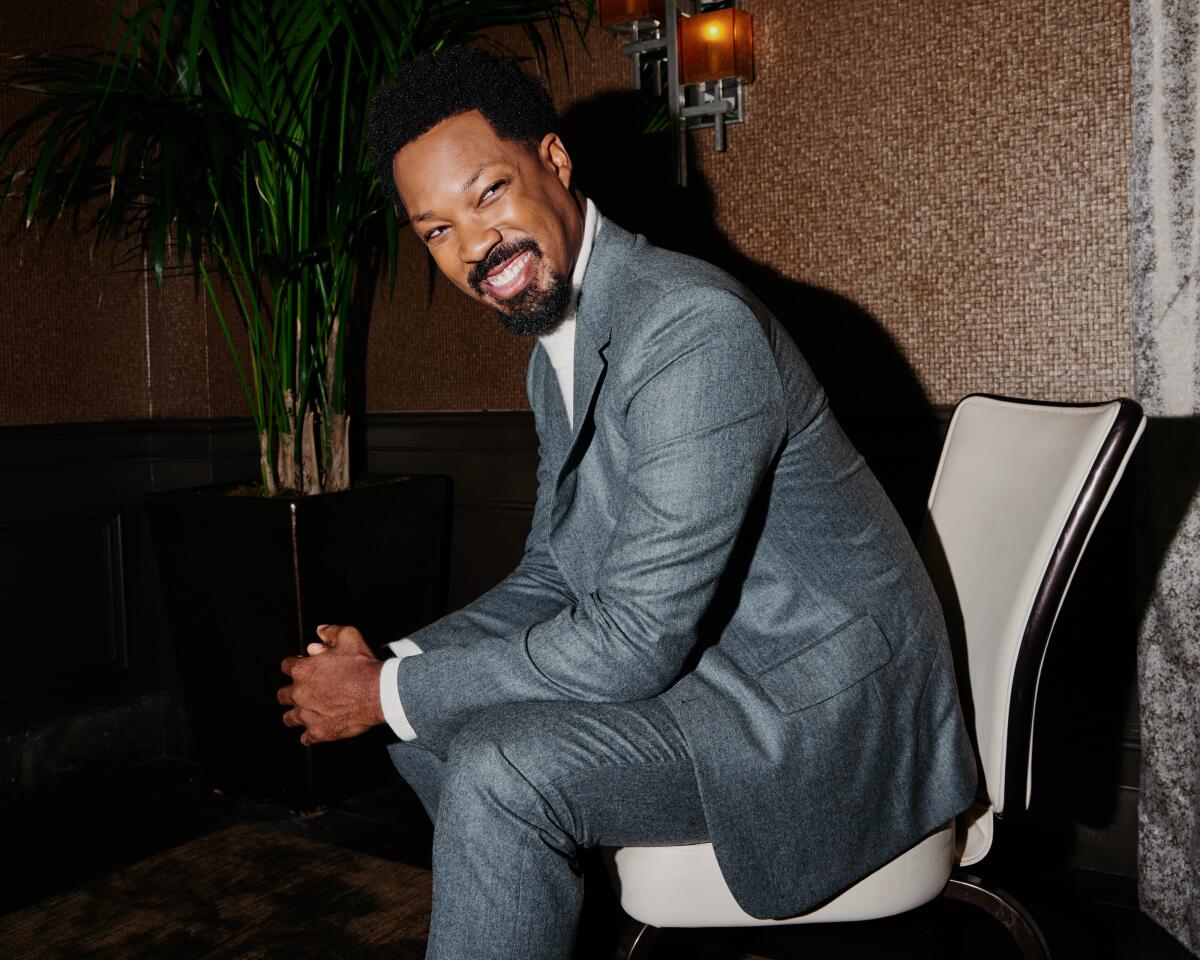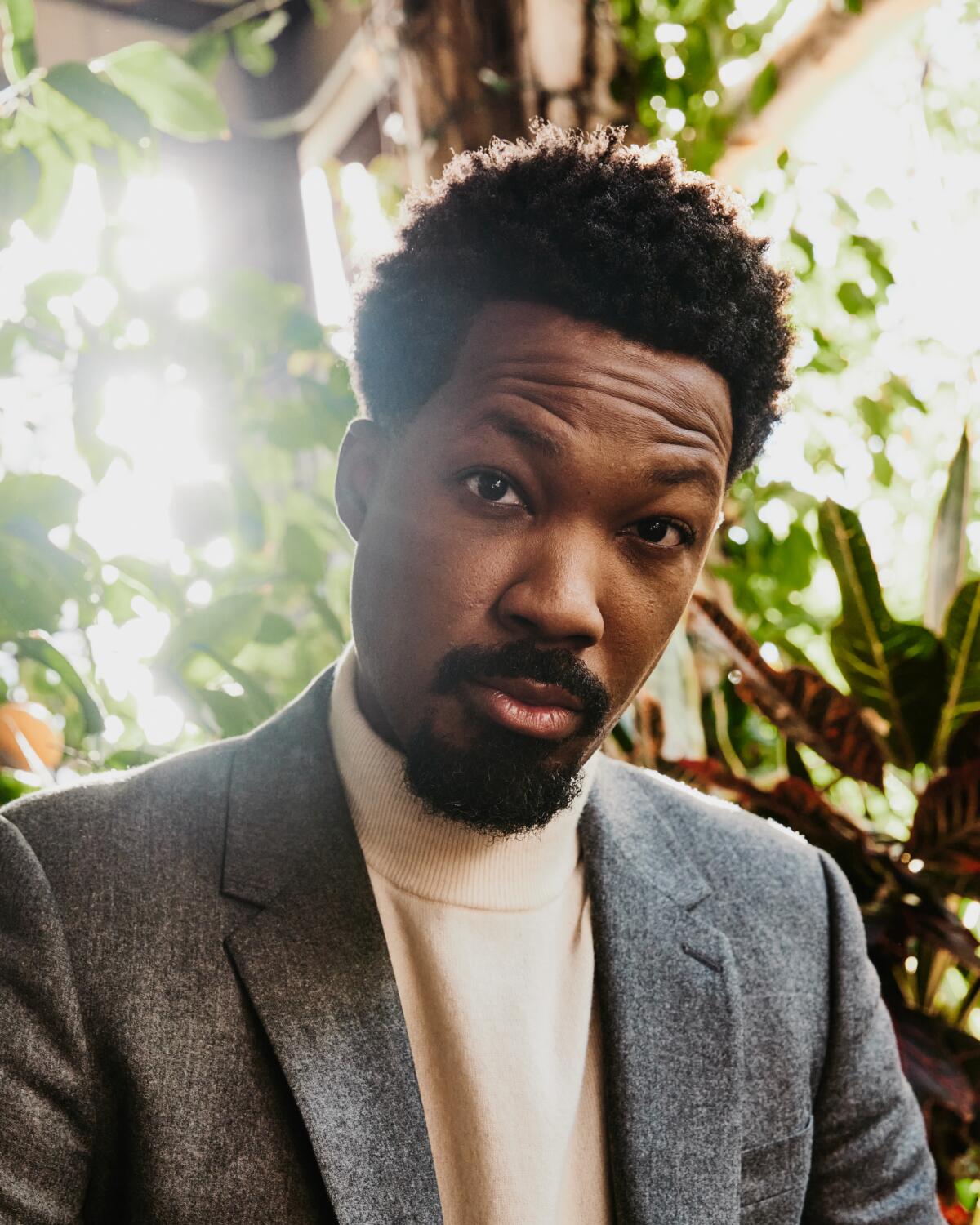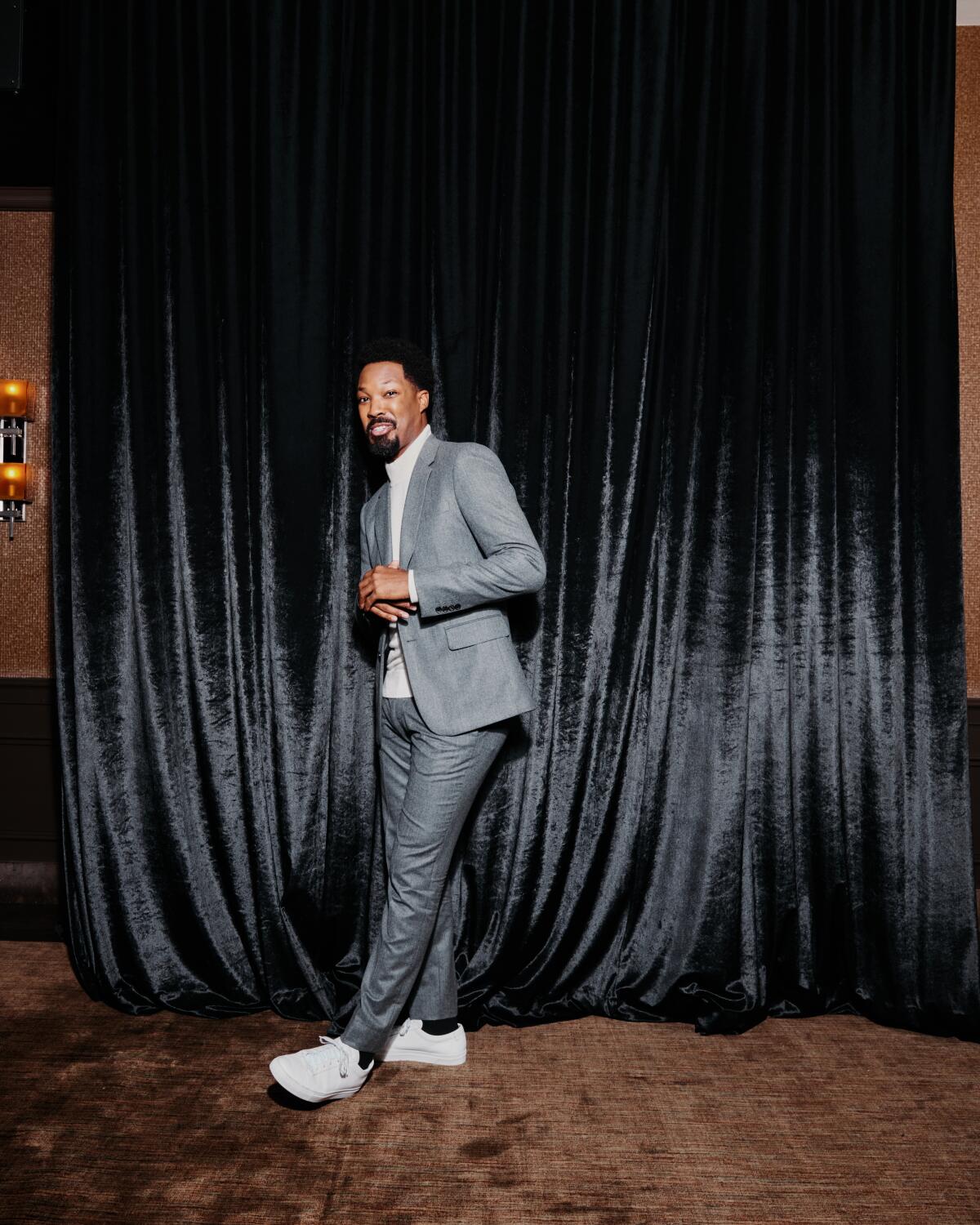Why ‘Macbeth’ actor Corey Hawkins felt compelled to study the classics

- Share via
It was early 2020 and Corey Hawkins was preparing to shoot “The Tragedy of Macbeth” on the Warner Bros. lot in Burbank, when he arrived for a meeting with director Joel Coen. “The first thing he told me, sort of laughing, was: ‘You probably know more about this than I do.’” “Uh, thank you. I don’t think so,” Hawkins replied after a beat. “But I do know a little something.”
As a standout at Juilliard, Hawkins had played the title role in a 2010 stage production of “Macbeth,” followed by an equally impressive performance as Tybalt in a Broadway revival of “Romeo and Juliet,” leading up to his breakout role as brazen rap innovator Dr. Dre in “Straight Outta Compton,” the highest grossing music biopic at its 2015 release.
Now, with “The Tragedy of Macbeth,” a visually tantalizing take on Shakespeare’s tale of power lust, Hawkins is taking on the role of Macduff, the main antagonist to the scheming, late middle-age Macbeths: Denzel Washington and Frances McDormand.
Hawkins, 33, relished the challenge. “I’m drawn to characters who are the underdogs,” said the Washington, D.C., native, seen this past summer in John M. Chu’s film of Lin-Manuel Miranda’s musical “In the Heights.” “Being in rehearsals with these greats felt like being back on the stage.”
Hawkins spoke with The Envelope about the Bard, representation in classical films and how a crucial bit of acting advice from “D” helped with his role.
In your best Early Modern English: Bid us, what wast the most wondrous parteth of making “The Tragedy of Macbeth”?
[Laughs] Oh, man. Um, I would just say, “It giveth and giveth and giveth.” This was one of those projects a lot of actors, everybody had their eye on, and to be part of this incredible cast was bounteous in terms of feeding who I am. The chance that Joel took, for this to be his first film without [his brother and directing partner] Ethan, and seeing Denzel come back to Shakespeare and Frances in this role, the stars sort of aligned, and I was gifted with this opportunity to play in the sandbox with them.

You’re someone who likes to alternate between the screen and stage, much like Washington.
I first met Denzel at [New York’s] Public Theater a long time ago. He pulled me to the side, and we just started talking about our love of theater. That’s where we cut our teeth as actors. Then we talked film; the differences, what it allows versus what it can hold. I remember he said, essentially, “It’s the economy of it all. You’re always trying to hold something back. It’s all about what’s behind the eyes.”
How did your prior performance as Macbeth affect the way you played his rival Macduff?
I’d say because I had intellectualized and lived with Macbeth in a real way, it allowed me to humanize him a bit more as Macduff. This man murdered my family, Macduff’s family. At the end of the day, Macduff knows one of them is going to die. They’re going to get to it. For Macduff, there’s something bubbling just under the surface. But it was about putting that in check — that’s the thing Macbeth isn’t able to do; his is unchecked power.
When Macduff is in the forest and he finds out about his wife, he finds out about his kids, he keeps asking the question. “You’re telling me he killed all of them?” And he still doesn’t blame Macbeth. He blames himself. He says, “Sinful Macduff.” That’s a clue. That was a huge character clue for me about his compassion and his empathy. I talked to Joel just about drawing that out.
What was it like to film that scene in the forest?
That whole forest thing was built inside a studio. It was crazy. Denzel came to the set that day, and I remember we planned to shoot it with me facing the other actors. We had rehearsed it and rehearsed it and I was standing there with [castmates] Alex Hassell and Harry Melling and, for some reason, I needed to walk away. I went to talk to Joel. I was like, “Look, man, I think Macduff turns his back. There’s something that won’t let him show that raw emotion in this moment. There’s something about the figuring it out, because he’s not at the moment when he’s grieving them. He’s trying to understand what the hell just happened.” Joel was like, “Go for it. The camera will find you. Do what you need to do for this character.”
A number of roles are played by Black performers, including Lady Macduff [Moses Ingram]. Do you believe this Macbeth can turn the corner in terms of greater representation in Shakespearean films?
I certainly hope so. There’s something about Shakespeare and the language that, as a Black performer, I naturally get: the rhythms, the scansion, the iambic pentameter. It’s inherent in our blood, just in terms of the jazz and improv of it all. This work can hold all shapes, sizes and colors. It really can. I mean, we did it. We put it up there.
Having the classics on your resume doesn’t exactly scream “hire me” in Hollywood. Why’d you choose to study them?
So I wouldn’t be limited by an inability to do a certain thing. I want my toolbox to be as vast and wide as possible. Y’know what? I want to be able to do classics. And y’know what? I also haven’t forgotten where I’m from. All of that is a part of me, and that makes me unique. Not everybody can go dance on the side of a building and sing [like I did] in “In the Heights.” I’m fortunate that God’s given me the ability to do it, but I need to make sure I work on the right projects with the right people and that I say what needs to be said with my work.
As it is, there are so few spaces that allow us in, as Black people, and I’ll be damned if I’m going to not be a role model in the way Denzel or Sam Jackson were for me. I’ll be damned if I’m going to let a lack of training or lack of knowledge stop me from stepping into that power. That’s just where I am right now.

Last question: What is thy dreameth role in the Shakespeare canon?
There’s so many. [Laughs.] But Hamlet is at the top of my list. I would love, love, love to do Hamlet. Also, eventually, Othello, because Denzel talked to me about it years ago, and I remember thinking, “I love it.”
The film, which fully embraces the Scottish play’s thriller aspects, clocks in at 105 minutes. Was its swift pacing and delivery something Joel emphasized in rehearsals?
Here’s the thing: You’re dealing with a bunch of classically trained artists. Like, all of us in that cast are trained. So when dealing with Shakespeare, we know it all rides on the material. Joel didn’t have to put the metronome down for us to know the text has to fly. The characters don’t have time to think, because if they did, the play wouldn’t be the play. We’re operating, literally, at the speed of thought. It does move, and that’s why this production has been done so many times. But I think Joel was able to get inside of it in a really unique way, and that’s just kudos to him and his team. Joel trusted everybody to come in and do the work, which is the sign of a great director.
You also played Tybalt on Broadway in a 2013 production of “Romeo and Juliet.” Why do you think directors like to cast you as a rival of the protagonist?
That’s interesting. I hadn’t thought about that. I don’t know why they do. [laughs] I will say I’m drawn to characters who are the underdogs. In this play, Macduff is someone who looks up to Macbeth. He looks up to his prowess, his skill, his determination, his ambition. That ambition is the thing we all have. Macduff could easily — easily, very easily — become Macbeth should he choose the wrong course of action. Or is it fate?
That’s the same with Tybalt. I think he and Romeo are two sides of the same coin. He’s trying to protect Juliet, and he’s misunderstood. There’s something interesting about exploring the characters that people would say are “subplot.” I think there’s a liberty you sometimes get when you’re not the lead. I love jumping off the deep end with these characters and finding what’s writhing underneath. And that was important in the portrayal of Macduff for me.
More to Read
From the Oscars to the Emmys.
Get the Envelope newsletter for exclusive awards season coverage, behind-the-scenes stories from the Envelope podcast and columnist Glenn Whipp’s must-read analysis.
You may occasionally receive promotional content from the Los Angeles Times.









